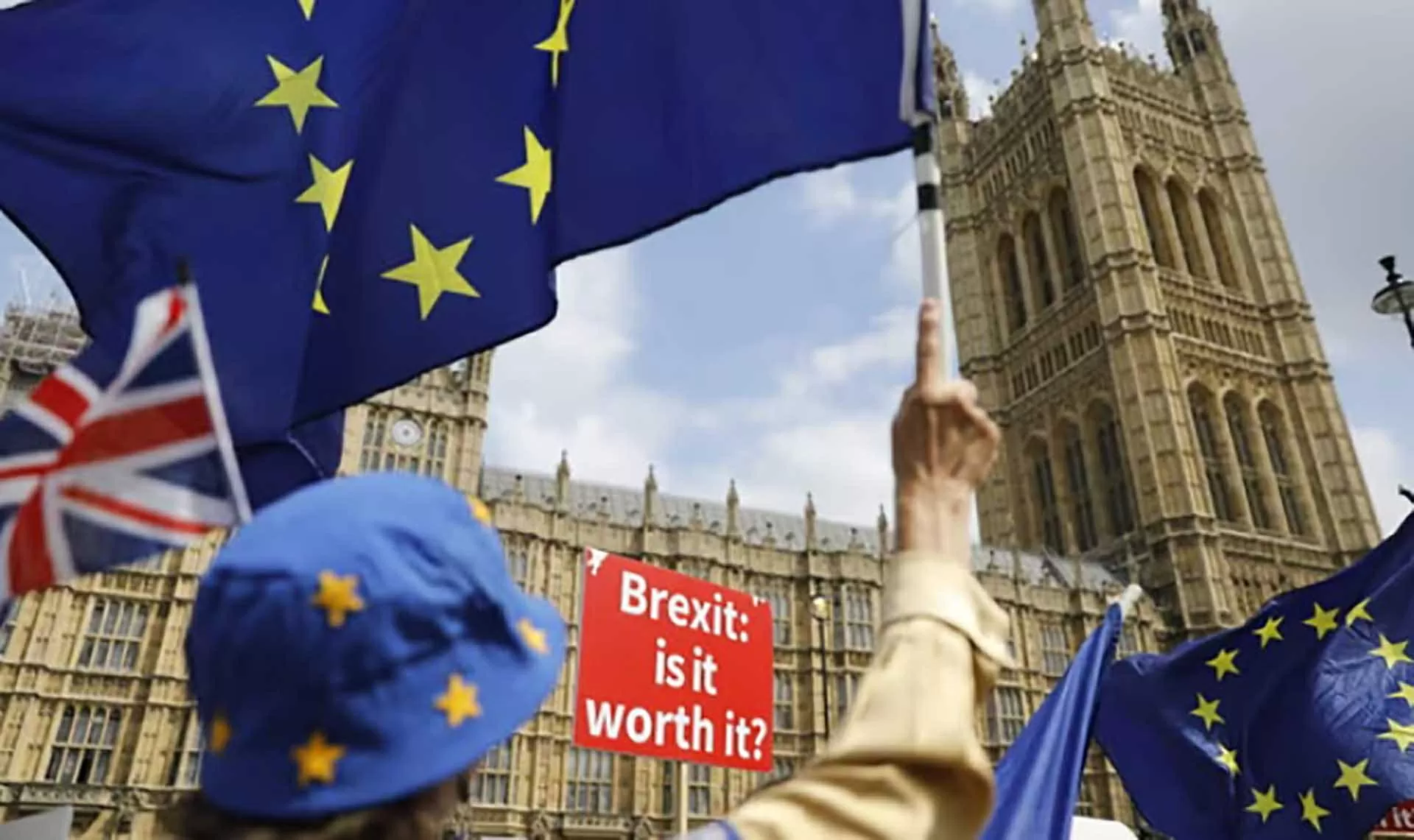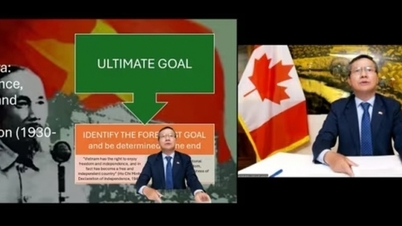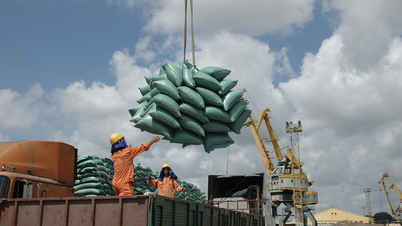On March 29, eight years ago, Britain triggered Article 50 of the Lisbon Treaty, officially starting the two-year negotiation process to leave the European Union (EU), also known as Brexit, marking the first time in EU history that a member state decided to "leave".
 |
| Anti-Brexit protesters outside the Houses of Parliament in London, Britain on July 18, 2018. (Source: AFP) |
In 1973, the UK joined the European Economic Community (EEC), which was established in 1957 under the Treaty of Rome. The EEC was established to promote economic integration among European countries, laying the foundation for the later "birth" of the European Union (EU), with the main goal of creating a common market, free circulation of goods, services, capital and labor among members. However, the UK has always been cautious with the EEC and later the EC, especially in deeply participating in European integration policy.
As a result, two years after joining the EEC, Britain held a referendum on whether to stay or leave and received 67% of the people in favor of remaining a member of the community.
However, the foggy country still kept its distance from the EU, as shown by its refusal to join the Eurozone in 1992. In 2015-2016, under political pressure, the government of then British Prime Minister David Cameron (2010-2016) pledged to hold a referendum on EU membership.
Determined to "divorce"
The main reasons for Brexit include concerns about sovereignty, immigration, economic factors and media influence. In 2016, The New York Times quoted an analysis by American economist Paul Krugman that some British people felt that the EU interfered too deeply in domestic policy, undermining national sovereignty. According to him, Brexit was not only an economic decision but also a political one, as many people wanted to regain self-determination on important issues such as immigration and the law.
Meanwhile, according to former British Prime Minister Tony Blair, Brexit is largely the result of long-standing dissatisfaction with the economy, when many regions feel they have not benefited from globalization.
Media campaigns, particularly from pro-Brexit newspapers such as The Daily Telegraph and The Sun, have contributed to growing public scepticism about the EU, with Brexit supporters arguing that Britain pays too much into the EU budget without receiving its fair share of the benefits.
In 2016, Boris Johnson, then Mayor of London and later Prime Minister of the UK (2019-2022), led the Brexit campaign with the statement: “Britain sends £350 million a week to the EU. If we leave the bloc, that money can be used for the national health system.” This slogan quickly became the core message of the Brexit campaign, although it was later rejected by many economic experts and verification agencies such as the Institute for Fiscal Studies (IFS) and the UK National Audit Office (NAO) because it did not take into account the amount of money the EU would return to the UK.
Former UK Independence Party (UKIP) leader Nigel Farage - one of the key figures pushing for Brexit - asserted that leaving the EU was an opportunity for Britain to regain control and escape the constraints of the bloc's regulations. The Brexit campaign was strongly promoted by politicians such as Boris Johnson and Nigel Farage with the slogan "Take Back Control".
On June 23, 2016, the Brexit referendum took place with a close result: 51.9% of the people supported leaving the EU while 48.1% wanted to stay. After this result, Prime Minister David Cameron, who tried to keep Britain in the EU, resigned and gave up his position to the then Conservative Party leader, Theresa May.
On March 29, 2017, Prime Minister May triggered Article 50 of the Lisbon Treaty, the provision that governs the process for a member state to leave the EU. Once triggered, that country has two years to negotiate the terms of its exit from the EU, unless all remaining member states agree to an extension. This is the legal basis for the UK to start the Brexit process, marking a major turning point in the history of UK-EU relations.
However, the Brexit negotiations in 2017-2019 encountered many obstacles. The negotiations dragged on with many deadlocks due to disagreements between the UK and the EU on the “backstop” clause, to avoid a hard border between Northern Ireland and the Republic of Ireland, as well as how to maintain trade relations between the two sides after the UK leaves the EU.
Despite trying to reach a deal with the EU, Prime Minister Theresa May failed to pass her Brexit deal through Parliament, leading to her forced resignation in 2019. London Mayor Boris Johnson took power and continued to push the process.
On January 31, 2020, the UK officially left the EU, starting a transition period with tough negotiations on post-Brexit trade agreements such as fishing rights, competition policy, etc. On December 24, 2020, the two sides reached an agreement, effective from January 1, 2021, and from this point on, the UK is considered to have truly "left".
“Warm - cold” after Brexit
Brexit is a political and economic event that has had a huge impact on the UK and Europe. Although the UK and the EU have officially ended their ties for many years, its “aftermath” still lingers, posing many challenges for London in adapting to its new position.
| “We need a stronger relationship with the EU to repair economic damage and create new growth opportunities for Britain,” British Prime Minister Keir Starmer said . |
At the moment when Britain officially “left”, then Prime Minister Boris Johnson emphasized that the country would be “an open, generous, outward-looking, internationalist and free-trading country”. Since then, no longer bound by EU regulations, Britain has sought its own trade cooperation opportunities, signing a series of free trade agreements with Australia, Singapore, Japan... Last February, during a meeting with British Prime Minister Keir Starmer in Washington, US President Donald Trump announced that the two sides were negotiating a bilateral trade agreement after Brexit.
However, on March 23, the Independent newspaper cited a report on the latest aggregated data from the British House of Commons library showing that Brexit is causing heavy damage to British businesses, losing about 37 billion pounds each year due to declining trade with the EU, contrary to predictions that the damage from Brexit will end after five years.
UK Trade Secretary Douglas Alexander said that between September 2023 and September 2024, trade between the UK and the EU would fall by 5% compared to 2018, after adjusting for inflation and excluding precious metals. Mr Alexander blamed the previous Conservative government's Brexit deal for the huge loss, asserting that "it is clear that the deal is not working".
For the EU, the departure of the UK - one of the continent's largest economies, important financial centers and leading military powers - has deprived the bloc of a "strong piece" in terms of economics, politics and security. Economically, Brexit has deprived the EU of one of its strongest trading partners, reducing the bloc's overall strength.
In terms of politics and security, the UK's withdrawal from the EU's common defense policy forces Europe to further strengthen its defense capabilities and intra-bloc cooperation to deal with global threats, terrorism and instability. According to Belgian expert Federico Santopinto from the EU Institute for Security Studies (EUISS), Brexit has weakened Europe's defense capabilities, especially in military operations in Africa and the Middle East, where the UK used to play an important role.
While NATO remains a linchpin of regional security, Brexit has weakened UK-EU coordination on defense, cybersecurity, and counterterrorism issues. According to a report by the European Council on Foreign Relations (ECFR), this separation has disrupted intelligence-sharing mechanisms and security cooperation, negatively affecting the ability to respond to common threats.
Faced with these challenges, the EU is forced to reform to strengthen its internal strength, avoid the risk of disintegration and maintain its position in the new world order. According to Professor Anand Menon of King's College London, Brexit has become a "painful lesson" for both the UK and the EU, and at the same time, it is pushing the EU to accelerate the process of deeper integration to ensure its future strength.
Whether Brexit was the right decision remains a controversial question in the UK and internationally. However, in the context of the increasingly unstable security situation in Europe with the conflict in Ukraine, especially the recent US tariff war with major trading partners, current British Prime Minister Keir Starmer is looking to promote closer relations with the EU. He stressed the need to improve economic and trade cooperation between the UK and the EU to reduce trade barriers, strengthen supply chains and increase competitiveness for British businesses. He also called for deeper cooperation in areas such as security and defense, scientific research and education to ensure Britain's position in a volatile world.
After nearly 50 years of UK integration into the EU with many ups and downs, doubts and failures, in the context of an increasingly unstable world, both sides are trying to reshape their positions in the post-Brexit era.
According to the article UK-EU Relations and European Security published on the UK Parliamentary Information Portal in October 2024, many Britons support closer ties with the EU in some areas where the benefits are clear, while some experts identify cooperation on security issues as a promising starting point for building relations. Perhaps they recognize that cooperation is one of the key factors to ensure security, economic growth and global standing for both the UK and the EU.
Source: https://baoquocte.vn/hanh-trinh-brexit-bai-hoc-lich-su-309032.html



![[Photo] Prime Minister Pham Minh Chinh chairs the first meeting of the Central Steering Committee on housing policy and real estate market](https://vphoto.vietnam.vn/thumb/1200x675/vietnam/resource/IMAGE/2025/9/22/c0f42b88c6284975b4bcfcf5b17656e7)





















![[Photo] General Secretary To Lam presents the First Class Labor Medal to the Vietnam National Energy and Industry Group](https://vphoto.vietnam.vn/thumb/1200x675/vietnam/resource/IMAGE/2025/9/21/0ad2d50e1c274a55a3736500c5f262e5)




































































Comment (0)